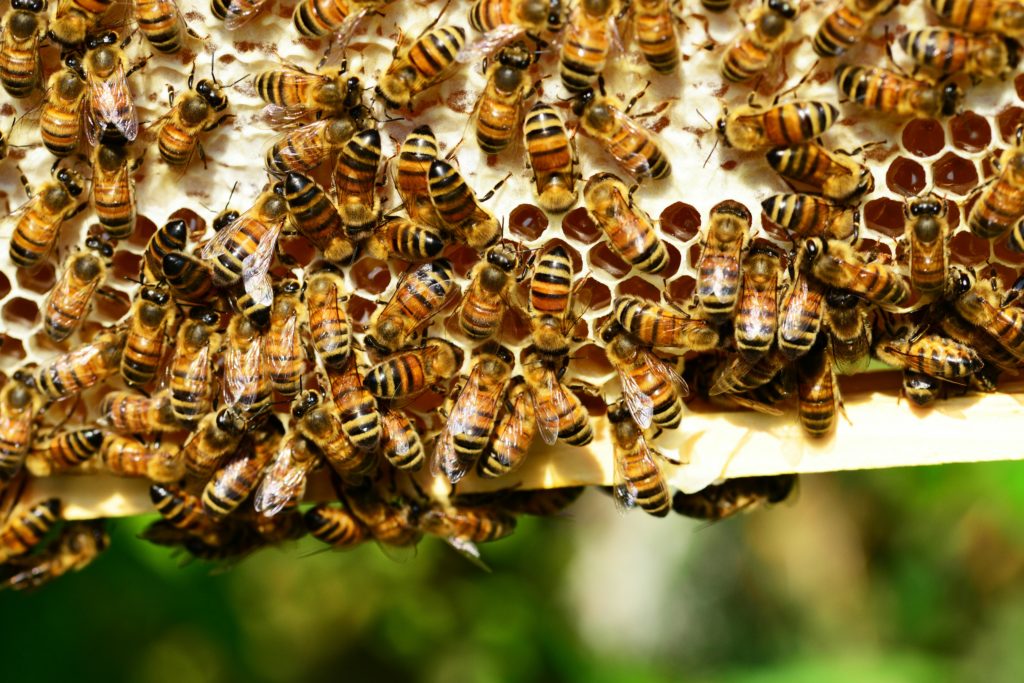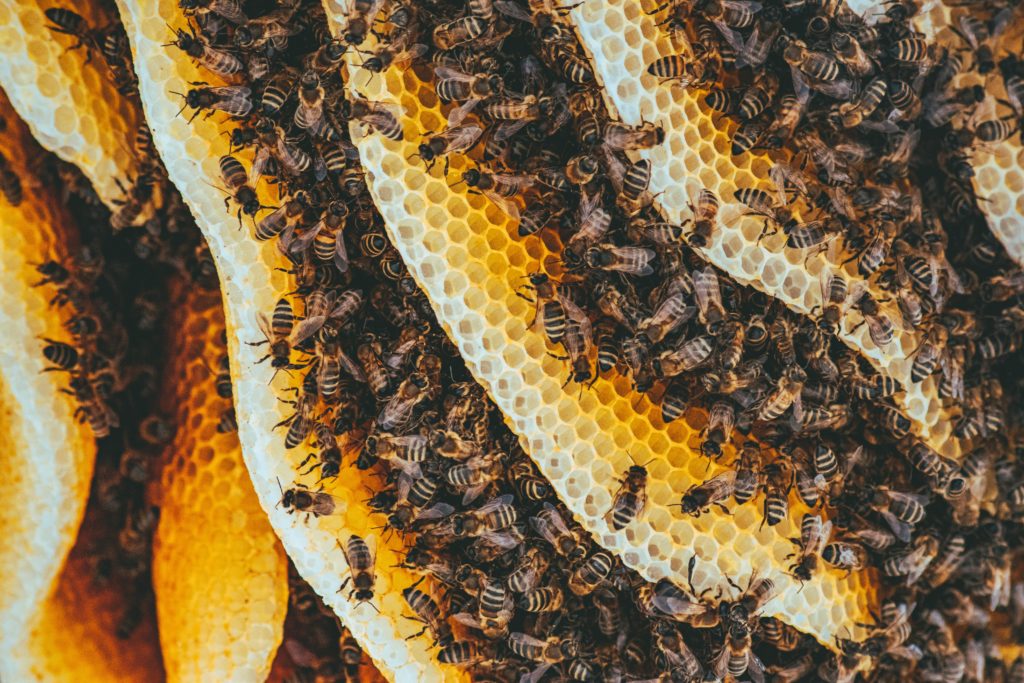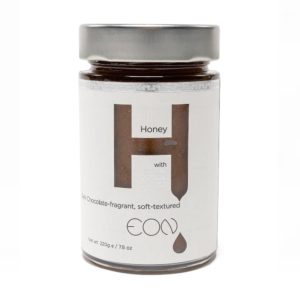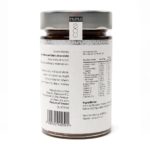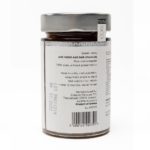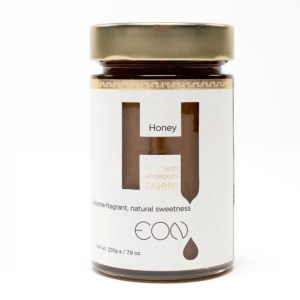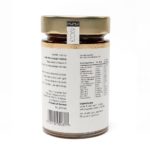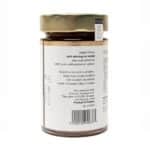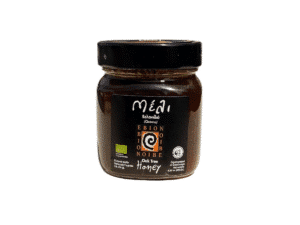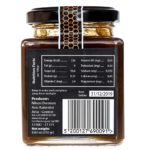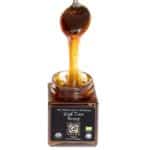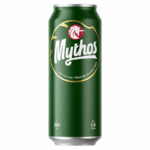Greek Honey: A Treasure of Mediterranean Nature
Greek honey offers much more than just natural sweetness. This natural treasure is packed with flavour and health benefits. Appreciated since Antiquity, it embodies the richness of the Mediterranean thanks to its exceptional quality and recognized virtues. Each region of Greece has its own unique honeys, reflecting the country’s botanical diversity. From thyme to pine to wildflower honey, each variety invites an unforgettable sensory experience.
The History of Honey in Greece: A Thousand-Year Heritage
Honey production in Greece dates back over 5,000 years, making it one of the oldest in the world. In Greek mythology, bees fed Zeus, king of the gods, honey during his childhood. The ancient Greeks considered honey to be the “nectar of the gods” and incorporated it into their diet, used it in religious rites and employed it for its medicinal properties.
The ancient Greeks added honey to their daily diet. They sweetened dishes, including desserts such as melomakarona and baklava, and made fermented drinks called meads. These traditions still influence Greek and European cuisine today.
Hippocrates, the father of medicine, recommended honey to treat wounds, digestive disorders and infections. In his writings, Aristotle emphasized its curative properties, consolidating its essential place in traditional Greek medicine.
Minoan craftsmen frequently featured bees in their creations. In Crete, at the palace of Malia, bee-shaped pendants illustrate the cultural and spiritual importance of this insect.
Today, Greek beekeepers are preserving this heritage. They adopt practices that respect bees and the environment, combining ancestral know-how with modern techniques. This continuity between tradition and innovation gives Greek honey a richness that goes beyond its simple sweetness, anchoring this product in a fascinating history.
The different varieties of Greek honey
Greece’s geographical and botanical diversity produces honeys that are unique in the world. Each variety illustrates the specific characteristics of its terroir, offering an unrivalled palette of flavours and aromas.
Thyme Honey
Thyme honey, emblematic of Greece, comes from sunny regions like Crete and the Dodecanese. Its intense floral aroma and silky texture seduce many connoisseurs. Appreciated for its antiseptic and energizing properties, it is a natural ally for boosting immunity.
Pine honey
Pine honey, harvested in the forests of Halkidiki and the Peloponnese, accounts for over 60% of honey production in Greece. This dark honey, with its thick texture and woody taste, is packed with minerals such as potassium and magnesium. Its exceptional shelf life and low crystallization make it the perfect choice for prolonged use.
Wild Flower Honey
Wildflower honey, from regions rich in Mediterranean flora, reflects the essence of local plants. It blends sweet, slightly tart flavors, with an aromatic complexity that varies with the seasons. Epirus and Thessaly produce varieties that are particularly appreciated for their rich flavor and unique character.
Fir Honey
Fir honey, harvested in the mountains of the Peloponnese and Mount Parnassus, is a rare and prized variety. Its creamy texture and subtly caramelized taste will appeal to lovers of unique honeys. Thanks to its low glucose content, it crystallizes very slowly, making it ideal for prolonged storage.
Blue Hour Honey (Erica)
Heather honey, harvested mainly in autumn, is distinguished by its amber hue and rich, slightly bitter taste. This honey is recognized for its nutritive and energizing qualities, making it an ideal choice for revitalizing the body and supporting a healthy diet.
Oak honey
Oak honey, from the dense forests of central Greece, is exceptionally rich in antioxidants. Its dark color and deep, malty taste appeal to lovers of intense flavors, offering a unique taste experience.
The health benefits of Greek honey
Greek honey, a real concentrate of nutrients, is a precious ally for well-being. Its therapeutic properties, derived from its richness in enzymes, vitamins and minerals, make it an essential superfood.
Boosting the immune system
Greek honey, especially thyme and fir, is packed with natural antioxidants that help protect the body against infection and disease. It stimulates the production of white blood cells, essential for fighting pathogens.
Digestive support
Thanks to its natural enzymes, Greek honey promotes healthy digestion. Eaten on an empty stomach or mixed with lukewarm water, it can relieve digestive disorders such as bloating or upset stomach. Heather honey, for example, is particularly beneficial for soothing gastric inflammation.
Soothes sore throats and coughs
Thyme honey, renowned for its antiseptic properties, relieves sore throats and soothes respiratory infections. Mixing a spoonful of honey with lemon or ginger soothes persistent coughs and moisturizes irritated mucous membranes.
Natural energy and recovery
With its high content of natural sugars, honey provides fast, long-lasting energy. Sportsmen and women use it to improve their performance or to recover after intense effort. Mixed with nuts or Greek yoghurt, it makes an ideal snack for boosting endurance.
Healing effects
Applied topically, Greek honey’s antibacterial properties can accelerate the healing of wounds and minor burns. Pine honey, in particular, is renowned for its skin-regenerating properties.
Sleep regulation
A spoonful of honey, taken before bedtime, promotes restful sleep by increasing glycogen production in the liver. This helps the brain to remain stable during the night.
Support for skin and hair
Incorporated into natural masks, Greek honey deeply moisturizes and nourishes. It is ideal for dry or irritated skin and can also strengthen fragile hair.
The Greek Honey Production Process: A Careful Craft
Greek beekeepers have mastered ancestral know-how. Honey production in Greece is a careful process that combines traditional methods with modern, environmentally-friendly practices.
Location selection
Greek beekeepers set up their hives in areas rich in biodiversity, such as mountains, pine forests and thyme fields. These protected areas guarantee bees access to varied, natural flora, free from pesticides and pollutants. This attention to the bees’ living environment plays a crucial role in the quality of the honey we produce.
Care for bees
Bees are treated with care and respect, as they are at the heart of production. Beekeepers are careful not to disturb the colonies and to leave them enough honey for their own subsistence, especially during winter.
Hand harvesting
The honey is carefully harvested, often by hand, to avoid stressing the bees. After harvesting, beekeepers gently extract the honey from the wax combs, without excessive heating or chemical treatment, to preserve all its nutritional and organoleptic qualities.
Gentle extraction and filtration
The honey is extracted from the combs by centrifugation, a mechanical method that requires neither excessive heating nor the addition of chemicals. This approach preserves honey’s enzymes, aromas and therapeutic properties. A light filtration is then carried out to remove impurities, while preserving its natural texture.
Rigorous quality control
Each batch of honey undergoes strict controls to verify its purity, moisture and composition. These analyses guarantee a product that meets the high standards of Greek beekeeping.
Respectful potting
The honey is jarred without pasteurization, preserving its organoleptic qualities and essential nutrients. The packaging, often designed locally, reflects Greek authenticity and identity.
Greek honey in Mediterranean cuisine
Greek honey is much more than just a natural sweetener, it’s a veritable star ingredient in Mediterranean gastronomy. Its nuances of flavor, from delicate floral to intense woody, make it a precious ally for sublimating dishes.
Emblematic desserts
Greek honey is at the heart of the region’s emblematic sweet recipes. The baklava, with its crisp layers of filo pastry, is generously soaked in honey, creating a perfect balance of sweetness and crunch. Loukoumades, small golden doughnuts, are dipped in honey and sprinkled with cinnamon for an explosion of flavor. Even simple toast, topped with honey and sprinkled with walnuts, is a must-have treat.
Savoury cooking
Greek honey also plays a key role in savoury preparations. It is often used to glaze meats such as lamb or chicken, creating a delicate, fragrant caramelization. Grilled fish, enhanced with honey and Mediterranean herbs, reveals a unique depth of flavor. In marinades, it tenderizes meats while adding a subtle touch of sweetness.
Sauces and dressings
In vinaigrettes, Greek honey balances the acidity of lemon or vinegar, adding a refined sweetness. Mixed with extra-virgin olive oil and mustard, it makes perfect sauces for salads, roasted vegetables or cold meats.
Gourmet accompaniment
Greek honey also enhances fresh produce. Drizzled over Greek yoghurt and accompanied by dried fruit, it makes a healthy, energizing breakfast. With cheeses such as feta or graviera, it creates an irresistible sweet-savory contrast, often served as an aperitif.
A touch of refinement
Modern chefs use Greek honey in innovative creations. Cocktails with honey add a natural sweetness, while contemporary desserts such as panna cotta or ice cream take advantage of its rich aromas to surprise the palate.
Thyme Honey: A Greek Speciality
Thyme honey is one of Greece’s most emblematic and sought-after varieties. Originating in sunny regions and rocky terrain, where wild thyme grows in abundance, it symbolizes the authenticity and richness of the Mediterranean terroir.
Production linked to climate and terroir
Thyme honey production relies on bees foraging on thyme flowers, which are particularly common on islands such as Crete, Rhodes and Kythnos, as well as in the mountainous areas of the Peloponnese. These regions offer a dry climate and limestone soils, ideal conditions for abundant flowering and top-quality nectar.
A unique aromatic profile
Thyme honey seduces with its complex taste and velvety texture. Its herbaceous aromas, often accompanied by a slight bitterness on the finish, make it an ingredient of choice in gastronomy. Its subtle notes evoke both the warmth of the Mediterranean sun and the freshness of wild herbs.
Benefits recognized since Antiquity
In ancient Greece, thyme honey was used as a natural remedy for its antiseptic and healing properties. Even today, it is appreciated for its antibacterial properties, which boost the immune system. It is also recommended for relieving sore throats and respiratory inflammation. Its rich antioxidant content helps combat oxidative stress, preserving overall health.
Versatile use
In cooking, thyme honey enhances both sweet and savory dishes. It’s perfect for topping Greek yogurt, accompanying cheeses like feta, or glazing meats like lamb or chicken. In pastries, it enhances the flavors of baklava and semolina cakes.
A rare and precious product
The harvesting of thyme honey is delicate and limited, making it a precious product. Beekeepers must wait for ideal conditions, as thyme flowering is short and highly dependent on the annual climate. This further enhances its value and exclusivity in local and international markets.
How to tell the difference between commercial and artisanal Greek honey
To recognize authentic, handcrafted Greek honey, you need to pay attention to a number of details that bear witness to its quality and origin.
Texture and appearance
Artisanal honey often has a denser, granular texture, resulting from the absence of excessive filtration. Its color varies according to variety: thyme honey has an amber hue, while pine honey is darker. Industrial honey, on the other hand, can appear too clear and uniform, a sign of intensive processing.
Crystallization
Crystallization is a natural phenomenon for pure, artisanal honey, which does not undergo excessive heating. A thyme or wildflower honey will crystallize over time, while an industrial honey, treated to remain liquid, will not. This crystallization, far from being a defect, guarantees the purity of the product.
Taste and aroma
Artisanal honey offers richer, more complex flavors, which vary according to the region and the flowers foraged. It retains the natural notes specific to each type of Greek honey. Industrial honey, on the other hand, is often standardized, with less pronounced aromas.
Provenance and labelling
Artisanal Greek honey usually comes with a clear indication of its provenance, often mentioning the region or island where it was produced, such as Crete or the Peloponnese. Also check whether the producer guarantees a local, artisanal production method. Industrial honeys often mix products from different origins, as indicated on the label.
The home purity test
To check the quality of a honey, place a spoon in a glass of cold water without stirring. Pure honey will dissolve slowly, forming ribbons, while industrial honey will mix quickly with water, often due to additives or syrup.
Favoring short circuits
Buying directly from local producers or at specialized markets is the best way to ensure honey quality. Greek beekeepers use traditional practices that respect bees and their environment, guaranteeing a natural, authentic product.
An environmentally-friendly product
By choosing Greek artisanal honey, you are supporting sustainable production methods. Unlike commercial honey, often associated with intensive practices and overexploited bees, artisanal honey respects natural cycles and helps preserve biodiversity.
Honey-producing regions in Greece
Each region of Greece has its own unique ecosystem, giving rise to honey varieties with distinct flavors and qualities.
The Peloponnese
This mountainous region is famous for its “vanilla” fir honey, a rare variety prized for its creamy texture and delicate aroma. Thyme honey, from the sunny hills, is also emblematic, offering intense flavor and a golden color.
Crete
The island of Crete, with its exceptional biodiversity, is a Mecca for honey production. The bees gather wild flowers, aromatic herbs such as dictamus, and Mediterranean shrubs, producing a honey rich in aromas and nutrients. Cretan honey is appreciated for its complexity and medicinal properties.
The Cyclades
In this archipelago, honey is often produced from wildflowers, thyme and sometimes even mastic. Islands like Naxos and Amorgos offer honeys with a more floral character, ideal for accompanying traditional Greek desserts.
Macedonia
This region of northern Greece is famous for its chestnut honey, a dark honey with a full-bodied, slightly bitter taste, rich in antioxidants. Macedonia’s pine forests also produce a robust honey, appreciated for its energy-giving benefits.
Thessaly
Thessaly’s vast plains and mountains allow for diversified production, including fir, flower and heather honey. Harvested in autumn, it is rich in iron and magnesium, ideal for revitalizing the body.
The Ionian Islands
Islands like Kefalonia and Corfu produce unique honeys thanks to their Mediterranean flora. Floral honeys are light and delicate, perfect for lovers of subtle sweetness.
The regions of Epirus and Thrace
These wilder areas are home to bees foraging for rare plants. Heather and oak honey are particularly prized for their rich mineral content and robust flavor.
A journey in every pot
Each region of Greece adds its own special touch to its honey, reflecting its climate, flora and beekeeping traditions. To taste Greek honey is to explore a unique facet of the country, from its mountains to its islands, while savoring the fruit of ancestral know-how.
Greek Honey: A Gift of Nature to Enjoy Every Day
Greek honey enriches dishes with unique flavors, from floral aromas to woody notes. It enhances infusions, tops pancakes and goes perfectly with Greek yoghurt. Each spoon evokes the riches of the Mediterranean.
This natural treasure is packed with antioxidants, enzymes and vitamins. It boosts immunity, improves digestion and provides healthy energy to start the day. Regular consumption of this honey contributes to a balanced diet.
By choosing artisanal honey, you directly support local beekeepers. These enthusiasts enable bees to forage in natural, uncontaminated environments, far from urban and industrial areas. Each pot reflects their respect for nature and their commitment to biodiversity.
Adopting Greek honey reflects an eco-responsible approach. This pure, local nectar offers a sustainable alternative to industrial sugars. Its production is based on practices that promote environmental protection.
In cooking or beauty care, honey unfolds its full potential. It moisturizes, soothes and enhances flavors in homemade creations. This treasure enriches your day while taking care of you.
Our Greek honeys



